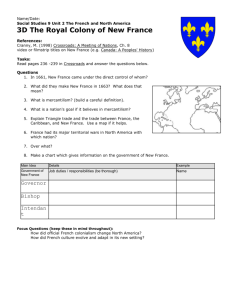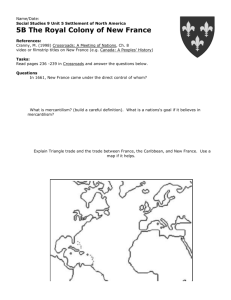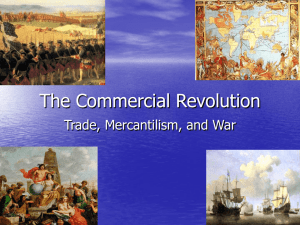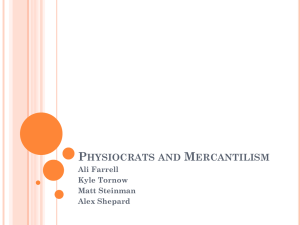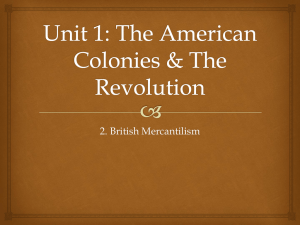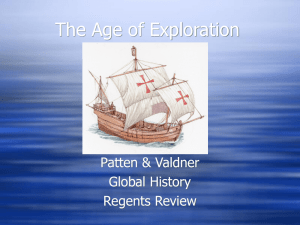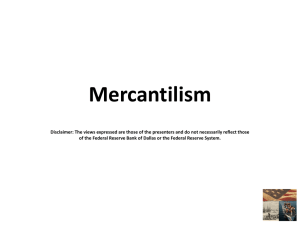MS Word - Department of Economics
advertisement
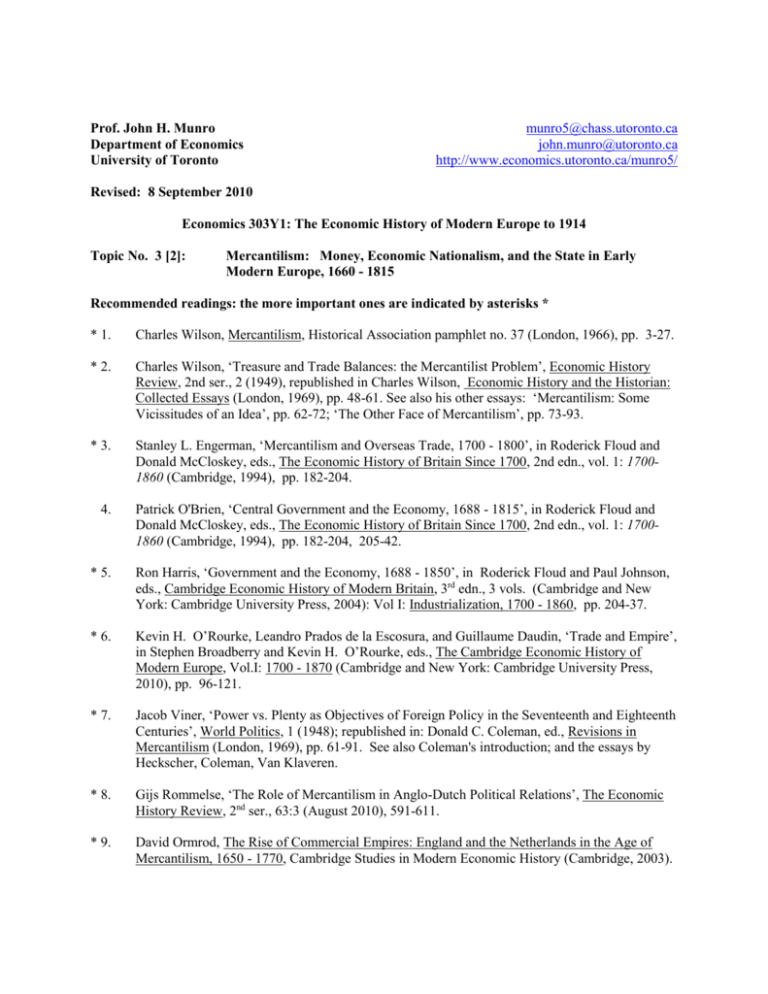
Prof. John H. Munro Department of Economics University of Toronto munro5@chass.utoronto.ca john.munro@utoronto.ca http://www.economics.utoronto.ca/munro5/ Revised: 8 September 2010 Economics 303Y1: The Economic History of Modern Europe to 1914 Topic No. 3 [2]: Mercantilism: Money, Economic Nationalism, and the State in Early Modern Europe, 1660 - 1815 Recommended readings: the more important ones are indicated by asterisks * * 1. Charles Wilson, Mercantilism, Historical Association pamphlet no. 37 (London, 1966), pp. 3-27. * 2. Charles Wilson, ‘Treasure and Trade Balances: the Mercantilist Problem’, Economic History Review, 2nd ser., 2 (1949), republished in Charles Wilson, Economic History and the Historian: Collected Essays (London, 1969), pp. 48-61. See also his other essays: ‘Mercantilism: Some Vicissitudes of an Idea’, pp. 62-72; ‘The Other Face of Mercantilism’, pp. 73-93. * 3. Stanley L. Engerman, ‘Mercantilism and Overseas Trade, 1700 - 1800’, in Roderick Floud and Donald McCloskey, eds., The Economic History of Britain Since 1700, 2nd edn., vol. 1: 17001860 (Cambridge, 1994), pp. 182-204. 4. Patrick O'Brien, ‘Central Government and the Economy, 1688 - 1815’, in Roderick Floud and Donald McCloskey, eds., The Economic History of Britain Since 1700, 2nd edn., vol. 1: 17001860 (Cambridge, 1994), pp. 182-204, 205-42. * 5. Ron Harris, ‘Government and the Economy, 1688 - 1850’, in Roderick Floud and Paul Johnson, eds., Cambridge Economic History of Modern Britain, 3rd edn., 3 vols. (Cambridge and New York: Cambridge University Press, 2004): Vol I: Industrialization, 1700 - 1860, pp. 204-37. * 6. Kevin H. O’Rourke, Leandro Prados de la Escosura, and Guillaume Daudin, ‘Trade and Empire’, in Stephen Broadberry and Kevin H. O’Rourke, eds., The Cambridge Economic History of Modern Europe, Vol.I: 1700 - 1870 (Cambridge and New York: Cambridge University Press, 2010), pp. 96-121. * 7. Jacob Viner, ‘Power vs. Plenty as Objectives of Foreign Policy in the Seventeenth and Eighteenth Centuries’, World Politics, 1 (1948); republished in: Donald C. Coleman, ed., Revisions in Mercantilism (London, 1969), pp. 61-91. See also Coleman's introduction; and the essays by Heckscher, Coleman, Van Klaveren. * 8. Gijs Rommelse, ‘The Role of Mercantilism in Anglo-Dutch Political Relations’, The Economic History Review, 2nd ser., 63:3 (August 2010), 591-611. * 9. David Ormrod, The Rise of Commercial Empires: England and the Netherlands in the Age of Mercantilism, 1650 - 1770, Cambridge Studies in Modern Economic History (Cambridge, 2003). *10. 11. 12. John Maynard Keynes, The General Theory of Employment, Interest, and Money (London, 1935): Chapter 23, ‘Notes on Mercantilism...’ pp. 333-71. Harry Johnson, ‘Mercantilism: Past, Present, and Future’, The Manchester School of Economic and Social Studies, 44 (1974), 1-17. Eli Heckscher, Mercantilism, 2 vols., 1st edition, 1931; 2nd edition revised by Heckscher and ed. by E.F. Soderlund, trans. by Mendel Shapiro (London, 1955), Vol. II: as follows:. Part II: ‘Mercantilism as a System of Power’, pp. 13-49. Part III: ‘Mercantilism as a System of Protection’, pp. 53-172. Part IV: ‘Mercantilism as a Monetary System’, pp. 175-66. Part V: ‘Mercantilism as a Conception of Society’, pp. 269-339. Conclusion: ‘Keynes and Mercantilism’, pp. 340-359. 13. Eli Heckscher, ‘Revisions in Economic History: Mercantilism’, Economic History Review, 1st ser. 7 (1936-37). Republished in: (a) Donald C. Coleman, ed., Revisions in Mercantilism, Debates in Economic History Series (London, 1969), pp. 19-24; (b) Mark Blaug, ed., Pioneers in Economics, Section One: The Forerunners of Classical Economics, Vol. IV: The Early Mercantilists (Brookfield, Vt., 1991). 14. Ralph Davis, ‘The Rise of Protection in England, 1689 - 1786’, Economic History Review, 2nd ser. 19 (1966), 306 - 17. 15. Donald Coleman, ‘Editor’s Introduction’, in D.C. Coleman, ed., Revisions in Mercantilism (1969)., pp. 1-18. See also Donald Coleman, ‘Colbertism’, in John Eatwell, Murray Milgate, and Peter Newman, eds., The New Palgrave: Problems of the Planned Economy (New York: W.W. Norton and Co., 1990), pp. 51-53. 16. Robert B. Ekelund and Robert F. Hébert, A History of Economic Theory and Method, 3rd edn. (New York, 1990), chapter 3, ‘Mercantilism and the Dawn of Capitalism’, pp. 55 - 72. 17. R.C. Blitz, ‘Mercantilist Policies and the Pattern of Trade, 1500-1750’, Journal of Economic History, 27 (1967), 39-55. Republished in Mark Blaug, ed., Pioneers in Economics, Section One: The Forerunners of Classical Economics, Vol. IV: The Early Mercantilists (Brookfield, Vt., 1991). 18. Lars Magnusson, Mercantilism: The Shaping of an Economic Language (London and New York: Routledge, 1994). 19. Andrea Finkelstein, Harmony and the Balance: an Intellectual History of English Economic Thought (Ann Arbor: University of Michigan Press, 2000). * 20. Joseph Schumpeter, History of Economic Analysis (New York, 1954), Chapter VII: ‘The Mercantilist Literature’, pp. 355-61. QUESTIONS: 1. Is the term ‘Mercantilism’ historically justifiable? Why are some historians, such as and Donald Coleman, so opposed to the term? [So, for example, is Rondo Cameron, A Concise Economic History of the World from Paleolithic Times to the Present, 2nd edn. (Oxford, 1993), pp. 130-32: ‘Mercantilism: a Misnomer’. This was a former textbook for an earlier version of this course, Eco. 203Y.] How have modern economists used the term? 2. Discuss J.M. Keynes sympathetic view of ‘Mercantilism’, in terms of his rather hostile views towards the Classical School. How do his views on Mercantilism accord with his ‘General Theory’? 3. What were the key aims and objectives of those government economic policies known as ‘mercantilism’ in early modern Europe, particularly in terms of: bullionism, protectionism, and national power (or defence)? Were those policies chiefly promoted by merchants, industrialists, or by statesmen: in England, France, the Netherlands? 4. How did various ‘mercantilist’ writers define money, wealth, and national power? Did they believe that national wealth and national power were competing or complementary economic objectives? 5. Why did such mercantilist writers and statesmen or national policy makers seek to maintain a bullion influx? What benefits did they see in a larger stock and/or circulation of ‘money’? 6. What were the forms, aims and objectives of protectionist legislation: both monetary and nonmonetary objectives? Did such policies in fact promote or retard national economic growth in western Europe? Compare and contrast the form and impact of such trade policies in England, the Netherlands, and France in the 17th and 18th centuries. And in Canada in the 20th century: Protectionism vs. Free Trade? 7. Why is the period ca. 1620 - ca. 1760 considered to be the ‘heyday of mercantilism’ in western Europe? What relevance do the economic policies of this era have to contemporary economic trends: in terms of demography, money, prices, and international trade? 8. What relevance does this topic on ‘Mercantilism’ have with the topic on ‘The General Crisis of the Seventeenth Century’; and also the topic on ‘The Economic Decline of the Netherlands in the Eighteenth Century’?
